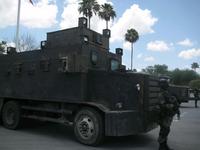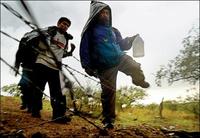-
CBP buys upgraded aircraft for border patrol

U.S. Customs and Border Protection (CBP) purchased its new King Air 350, twin engine Multi-role Enforcement Aircraft (MEA), bolstering DHS’s capabilities of patrolling the skies along U.S. borders; designed to be a truly multi-role aircraft, the MEA is equipped with a sophisticated array of active and passive sensors, technical collection equipment, and satellite communications capabilities that can be deployed for ground interdiction operations, air-to-air intercept operations, and medium-range maritime patrols
-
-
Police chiefs oppose proposed Texas immigration measure
Texas governor Rick Perry wants the legislature to pass a measure which would prohibit local police agencies from barring their officers from asking people they pull over, or otherwise detain, about their legal status in the United States; police chiefs from Houston and Dallas say the bill would impose additional costs on their already-strained budgets and would end up hampering public safety, because it would force them to divert resources and manpower to dealing with undocumented immigrants rather than criminals
-
-
Alabama joins E-Verify program
Last Thursday Alabama Governor Robert Bentley signed a tough new immigration bill that includes a requirement that all employers in the state to use the E-Verify system; under the law, all employers will have to verify a prospective worker’s immigration status using the E-Verify system; the law also requires that businesses check the immigration status of day laborers and contains provisions regarding transportation and rental agreements
-
-
Massachusetts defies feds, rejects Secure Communities

Massachusetts has become the latest state to reject DHS’s Secure Communities program; the state announced it would not sign a memorandum of understanding to participate in the DHS program; Massachusetts is the fourth state to reject Secure Communities in recent weeks; New York, California, and Illinois have all made efforts to reject the program as well; a DHS official said the federal government will force Massachusetts to join the program and that the state has no jurisdiction to opt out
-
-
Airlines change bag policy after soldiers' video goes viral

Delta Airlines charged U.S. military personnel for check in additional bags on a returning from a tour in Afghanistan, sparking outrage and leading three airlines to change their baggage fee policies for service members; Delta forced thirty-six reservists from Oklahoma to spend a total of more than $2,800 to check in their fourth bags; video of the incident quickly went viral and veterans sharply criticized Delta for charging the service members; Pentagon official played down the incident, saying soldiers’ travel orders stipulate that the government would reimburse soldiers for all excess bag fees
-
-
Pakistan phases out U.S.-made border monitoring software
In 2002 the United States provide sixteen countries with a border-monitoring system called Personal Identification, Secure Comparison and Evaluation System (PISCES); Pakistan has now decided to replace the system with a Pakistani-developed system called Integrated Border Management System (IBMS); the government says the reason for the change is the IBMS is more capable, and denies the decision is the result of worries that the United States has access to PISCES-collected information
-
-
Mexican drug cartels build "narco tanks"

In the latest development in Mexico’s bloody drug trade, it seems that rival cartels are building large armored vehicles in their fight against one another; over the weekend, the Mexican Army found two “Mad Max” style “narco tanks” in Ciudad Camargo in the state of Tamaulipas near the Texas border; the two vehicles had inch-thick steel armor and were built on a three-axle truck bed with a heavily armored cabin; the vehicles were capable of withstanding fire from 50 caliber mounted weapons and grenade blasts; so far none of the tanks have been used to confront the Mexican Army and officials believe that they are primarily used in inter-gang warfare
-
-
SBInet: dismal failure // from Lee Maril, Ph.D.

SBInet was a dismal failure — at a cost of more than $1 billion to the American taxpayer; the public deserves much better than DHS has given us along the Mexican border, including a fair and objective investigation of Boeing’s waste of taxpayer’s money in hard economic times
-
-
Author of controversial Arizona immigration bill could face recall

A heated political battle in Arizona has begun that could result in the author of the state’s controversial immigration law Senate President Russell Pearce’s recall; the leaders of the recall effort, Citizens For A Better Arizona (CFBA), say they have collected more signatures for the petition to recall Pearce than the number of votes he received in the last election; on Tuesday, the group submitted 18,315 signatures in support of the recall, more than double the state’s requirement of 7,756 signatures; before the recall can move forward, the Maricopa County Recorder’s Office must validate each of the signatures
-
-
Twenty workers arrested on Colorado farm for forged IDs
A recent inspection by DHS officials found that 89 percent of workers at a dairy farm in Morgan County, Colorado were not authorized to work in the United States legally; twenty of the fifty-three employees found working illegally at Wildcat Dairy were arrested for using forged Social Security Cards and green cards; the workers will first be charged for possessing false identities, and once that case is settled their immigration status will be addressed; the owner of the dairy will not face any state charges, but could be charged by federal immigration authorities for failing to verify employees with the e-verify system
-
-
Sector Report for Thursday, 2 June 2011: Border / Immigration control
This report contains the following stories.
-
-
San Francisco sheriff defies federal immigration authorities
In defiance of federal immigration officials, San Francisco Sheriff Michael Hennessey announced that as of 1 June he would no longer hand over illegal immigrants arrested for low-level crimes to immigration authorities; Hennessey’s actions come in support of San Francisco’s sanctuary city policy which prohibits local officials from cooperating with federal authorities unless immigrants are suspected felons; illegal immigrants arrested for minor crimes like public intoxication or shoplifting will not be held in jail; the new policy does not bar individual sheriff’s deputies from cooperating with federal immigration officials
-
-
Heightened border security helps fuel billion dollar smuggling business
As the United States makes it more difficult to cross its borders illegally, business for human traffickers has been booming with smugglers making billions of dollars a year; traffickers make an estimated $6.6 billion each year by bringing immigrants across the U.S.-Mexico border; in May, x-ray machines at checkpoints in southern Mexico found 513 people crammed into two trailers, leading to the largest bust yet; the United States has inadvertently generated a boom in the smuggling business by making the border harder to cross; drug cartels are believed to have entered the lucrative market
-
-
One ton of marijuana, rescued hikers, arrest sex offenders seized on border
Border patrol agents in Arizona and California had a busy Memorial Day weekend intercepting large quantities of drugs, rescuing stranded hikers, and arresting two sex offenders; border patrol agents in the Tucson section of the U.S.-Mexico border interdicted more than a ton of marijuana along with four firearms; a total of 2,140 pounds of marijuana was intercepted with an estimated value of $1.7 million in Arizona alone;
-
-
Study: U.S. immigration policy perpetuates poverty

A new study says that the U.S. current immigration system — that is, the legal immigration system — is dysfunctional in that it is not responsive to the socioeconomic conditions of the United States; the main flaw in the current system — a flaw, the report argues, which will be exacerbated by allowing millions of undocumented immigrants to become citizens — is that only a small share of legally admitted immigrants is sponsored by employers while the bulk are admitted because of family ties to earlier immigrants who may be living in poverty or near poverty
-
- All
- Regional
- Water
- Biometrics
- Borders/Immig
- Business
- Cybersecurity
- Detection
- Disasters
- Government
- Infrastructure
- International
- Public health
- Public Safety
- Communication interoperabillity
- Emergency services
- Emergency medical services
- Fire
- First response
- IEDs
- Law Enforcement
- Law Enforcement Technology
- Military technology
- Nonlethal weapons
- Nuclear weapons
- Personal protection equipment
- Police
- Notification /alert systems
- Situational awareness
- Weapons systems
- Sci-Tech
- Sector Reports
- Surveillance
- Transportation
Advertising & Marketing: advertise@newswirepubs.com
Editorial: editor@newswirepubs.com
General: info@newswirepubs.com
2010-2011 © News Wire Publications, LLC News Wire Publications, LLC
220 Old Country Road | Suite 200 | Mineola | New York | 11501
Permissions and Policies
Editorial: editor@newswirepubs.com
General: info@newswirepubs.com
2010-2011 © News Wire Publications, LLC News Wire Publications, LLC
220 Old Country Road | Suite 200 | Mineola | New York | 11501
Permissions and Policies
